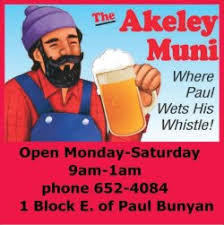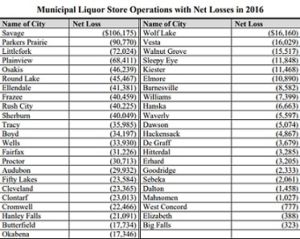Nearly 1 in 4 MN Cities Lose Money on Muni Liquor Stores
 Nearly one in four Minnesota cities with a municipal liquor store operated at a loss subsidized by local taxpayers last year, according to the state’s latest annual audit.
Nearly one in four Minnesota cities with a municipal liquor store operated at a loss subsidized by local taxpayers last year, according to the state’s latest annual audit.
The audit reveals that 45 out of the total of 195 cities in the liquor business reported a deficit in 2016, up from 34 cities the year before, an increase of about 25 percent of “munis” operating in the red. All but one (Savage) of the 45 cities losing money on muni liquor operations is located in Greater Minnesota.
Overall, statewide municipal liquor profits declined by eight percent or $2.1 million over the previous year, despite record sales. On-sale profits plummeted by almost 19 percent, while off-sale profits declined over 6 percent.
Under state law, 32 cities that have reported a loss in two of the last three years must hold a public hearing to discuss the future of their municipal liquor operations before November 17.
“City officials who are responsible for the operation of municipal liquor establishments should make certain that the operations are managed appropriately and do not have a negative financial impact on the city,” according to the auditor’s report.
Cities with municipal liquor enterprise funds face an increasingly competitive marketplace from a variety of sources, including the proliferation of Total Wine superstores in the metro area and higher labor costs driven by new Sunday store hours.
An industry group seized on the audit’s findings to put pressure on local governments to rethink whether cities belong in private business in the first place.
“This report articulates a troubling trend. It shows an increase in the number of cities losing money within their liquor operations and dwindling profits statewide,” said Jamie Pfuhl, Presidents of the Minnesota Marketplace Alcohol Alliance. “This brings to light the complexities of the role of municipal liquor operations. We urge local elected officials to start a thoughtful dialogue that evaluates the role that their municipal liquor operations play in relation to the communities they serve, and if it truly meets the best interests of their hardworking, taxpaying constituents.”
The Twin Cities suburb of Savage turned in the biggest loss of the year of $106,175, while Elk River recorded the biggest profit of $945,939. In the past five years, profits have declined by more than 16 percent for cities with muni liquor stores across the state.